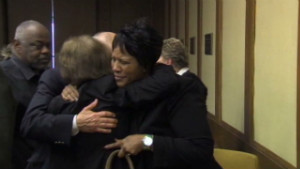The move follows Wednesday's verdict by a seven-member jury in Christiansburg, Virginia, that awarded $4 million each to two victims' families who sued the state for wrongful death in the shooting massacre.
"We are disappointed with today's decision and stand by our long-held position that the administration and law enforcement at Virginia Tech did their absolute best with the information available on April 16, 2007," Mark Owczarski, a university spokesman, said in a statement.
"We will discuss this matter with the attorney general, carefully review the case and explore all of the options available."
 Jury: VA Tech negligent in '07 shootings
Jury: VA Tech negligent in '07 shootings The jury found Virginia Tech failed to notify students early enough following the discovery of two shooting victims at West Ambler Johnston dormitory.
The two students were the first victims of Seung-Hui Cho, who went on to kill 30 more people at Norris Hall -- home to the Engineering Science and Mechanics Department -- after chaining the doors closed. He also wounded 17 people before killing himself.
The families of Erin Peterson and Julia Pryde, who were killed in Norris Hall, argued that had officials notified students, faculty and staff earlier of the shooting at the dormitory, lives might have been spared.
Peterson died while in her French class; Pryde was shot while attending an advanced hydrology class.
The Peterson and Pryde families did not accept a portion of an $11 million settlement between the state and the families of victims, opting instead to sue for wrongful death.
"It certainly was the end of a long process for us where we just said we wanted to get a little bit more truth. A little bit of accountability and we weren't just going to go away, and so we came here and this is what happened," Harry Pryde, Julia's father, told CNN affiliate WDBJ of Roanoke, Virginia.
While the jury awards the families $4 million each, an attorney for the state has asked the judge to reduce the verdict to $100,000 per claim. State law limits awards to $100,000, though the judge approved a request by an attorney for the family to file a motion on the matter.
The university does not believe the evidence presented during the trial showed there was an increased danger on campus, Owczarski, the university spokesman, said.
Virginia Tech President Charles W. Steger, in a letter to the school's faculty, staff and students, said the killings "were an unprecedented act of violence that no one could have foreseen."
The evidence presented during the trial "established that it was the unanimous decision of three law enforcement agencies that the mass shooting was simply not foreseeable. Only with hindsight can one conclude that Cho's unprecedented acts were foreseeable," Kenneth T. Cuccinelli II, a spokesman for the state attorney general, said in a statement following the verdict.
Authorities initially believed the shooting at the dormitory was a case of domestic violence, a jealous boyfriend who shot the couple. While police were questioning a possible suspect, Cho opened fire at Norris Hall.
The Department of Education found, in a 2010 report, that Virginia Tech did not notify students in a "timely manner" -- as dictated by what is known as the Clery Act -- after the shooting at the dormitory. The government also fined Virginia Tech for failing to follow internal school policies.
According to the Department of Education report, police went to the dormitory at 7:24 a.m. after being notified about the shooting of two students.
The university notified students, faculty and staff of the shooting in an e-mail at 9:26 a.m., the report said. It was about 15 minutes after the e-mail was sent that Cho began his rampage, it said.
Since the massacre, the school has beefed up its communications, using methods that include e-mail notices; telephone, cellular phone and text messages; classroom electronic message signs; posters; university website notices; campus loudspeakers and desktop alerts.
In addition, the safety phones in the campus and local community are connected to the campus 911 emergency operator and residential buildings are accessible only through a key card. Door alarms sound, alerting police, if an exterior door is propped open in a residence hall.
Tidak ada komentar:
Posting Komentar